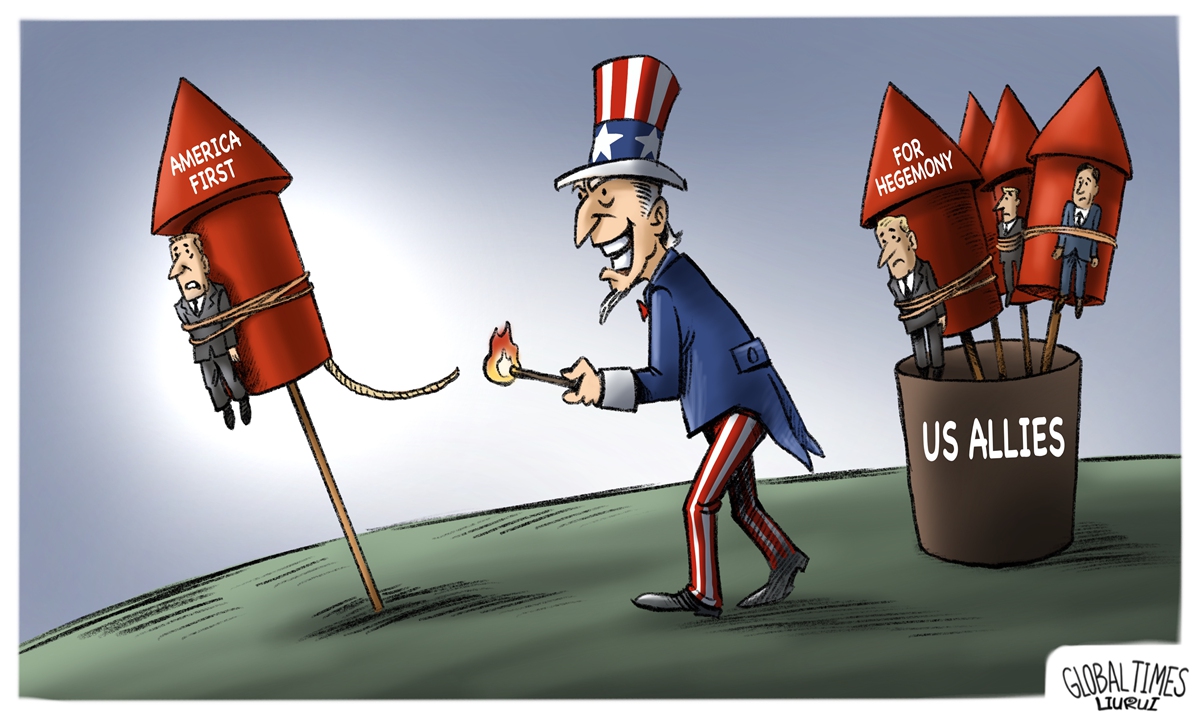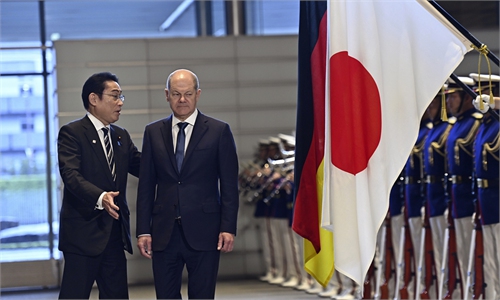
Illustration:Liu Rui/GT
Following South Korean President Yoon Suk-yeol's Japan visit on Thursday, German Chancellor Olaf Scholz arrives in the Japanese capital Tokyo for talks with Japanese Prime Minister Fumio Kishida on Saturday. Closer economic as well as morecomprehensive military cooperation are on the agenda at the top-level meetings in Tokyo.
On my recent parliamentary trip to Japan and South Korea, I found two deeply divided countries. One element is allowing itself to be harnessed to the US' policy of confrontation with China, not least because they also see advantages for themselves in that policy. Another element is skeptical of the US' military build-up in the region, the instrumentalization of their countries and the rising tensions.
In Karl Marx's The Eighteenth Brumaire of Louis Bonaparte, he writes: "Hegel remarks somewhere that all great world-historic facts and personages appear, so to speak, twice. He forgot to add: the first time as tragedy, the second time as farce."
Sure enough, the tragedy of the military challenge issued to Russia by the US and its allies now seems to be repeating itself vis-à-vis China in the form of a dangerous farce. In this piece of theatre played out on the stage of global politics, the US is trying everything to push Germany and Japan right to the fore. By supplying German battle tanks against Russia, Germany's Federal Government has allowed Washington to push it into the line of fire. Federal Chancellor Olaf Scholz's attempt to take the sting out of this by means of a simultaneous delivery of US Abrams battle tanks failed. Though the US promised to supply battle tanks of its own, it emphasized that it might well be months or even years before this being materialized.
Just as Germany's weapons deliveries are aimed at territory which German soldiers invaded in 1941, Japan's rearmament is also aimed at a country in which Japanese troops murdered millions of people and committed heinous war crimes. The historical amnesia displayed by elites in both countries plays an essential role in legitimizing their own massive rearmament, including the doubling of Japan's expenditure on arms to 2 percent of GDP. As for South Korea, it appears that the governing party attaches only marginal importance to Japanese war crimes in Korea and possible reparations, because the conflict about this stands in the way of South Korea and Japan being sent into the fray against China in tandem.
What is particularly dramatic, however, is the fact that Japan has now seemingly issued a military guarantee for its former colony, the island of Taiwan. That guarantee accompanies the US' efforts to arm the island, which - with more than $ 619 million in arms transfers, including missiles for US combat aircraft, and the stationing of 200 US military personnel - are fanning the flames of conflict on a grand scale. Japan, for its part, is planning to establish arms depots near the Taiwan island, exactly as if the island were back within Japan's sphere of influence. This also appears to be what the US is promising as a reward for Japan's rearmament, which is taking the country into further social difficulties and advancing the impoverishment of parts of its population.
Contacts in Tokyo have expressed the concern that Japan is also to be pushed into the frontline of the economic war on Russia and China, with disastrous consequences. Japan is still trying to steer a different course on this, fitted with a dunce's cap, by joining in with the sanctions against Russia on the one hand but, at the same time, stipulating far-reaching exceptions for energy supplies from Sakhalin island and continuing to rely on trade with its No.1 partner, China, on the other.
The question, however, is how long the US will let Tokyo maintain this dual strategy. There seems to be enormous pressure seeking to force Japan into a self-destructive strategy which, as in Germany, may lead to the end of that country's own economic model and the demolition of its industry.
At the same time, it was encouraging to see that, both in South Korea and in Japan, forces are gathering which are not prepared to throw their populations under a bus for a bourgeoisie behaving like compradors and politically selling out to the interests of US corporations and which are searching for a way out of an ever more deadly policy of confrontation. The German poet Friedrich Hölderlin wrote the pertinent line: "Where there is danger, the rescue grows as well." Let us hope that this holds true - both for global politics in general and for Japan and South Korea in particular.
The author is a Member of the German Bundestag and coordinator for her parliamentary group on the Committee on Foreign Affairs. opinion@globaltimes.com.cn

